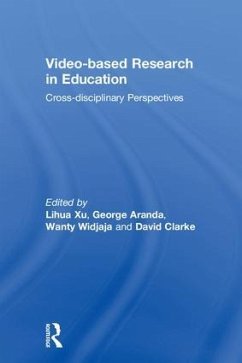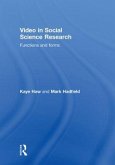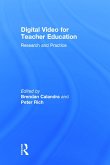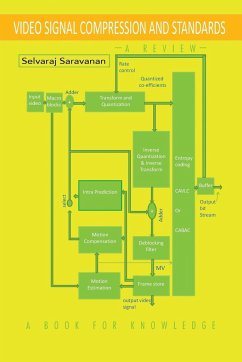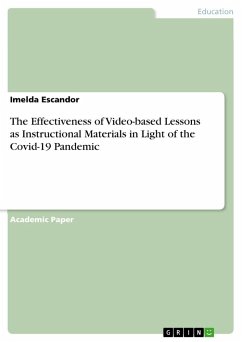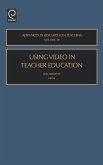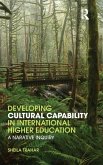Video-Based Research in Education
Cross-Disciplinary Perspectives
Herausgeber: Xu, Lihua; Clarke, David; Widjaja, Wanty; Aranda, George
Video-Based Research in Education
Cross-Disciplinary Perspectives
Herausgeber: Xu, Lihua; Clarke, David; Widjaja, Wanty; Aranda, George
- Gebundenes Buch
- Merkliste
- Auf die Merkliste
- Bewerten Bewerten
- Teilen
- Produkt teilen
- Produkterinnerung
- Produkterinnerung
Video-based Research in Education is a timely and significant collection exploring different uses of video in educational research, ranging from the use of video in investigating social interactions and stimulating participants' reflection, to engaging different social groups in the process of teaching, learning and research.
Andere Kunden interessierten sich auch für
![Video in Social Science Research Video in Social Science Research]() Kaye HawVideo in Social Science Research197,99 €
Kaye HawVideo in Social Science Research197,99 €![Digital Video for Teacher Education Digital Video for Teacher Education]() Digital Video for Teacher Education198,99 €
Digital Video for Teacher Education198,99 €![Video Signal Compression and Standards Video Signal Compression and Standards]() Selvaraj SaravananVideo Signal Compression and Standards19,99 €
Selvaraj SaravananVideo Signal Compression and Standards19,99 €![The Effectiveness of Video-based Lessons as Instructional Materials in Light of the Covid-19 Pandemic The Effectiveness of Video-based Lessons as Instructional Materials in Light of the Covid-19 Pandemic]() Imelda EscandorThe Effectiveness of Video-based Lessons as Instructional Materials in Light of the Covid-19 Pandemic17,95 €
Imelda EscandorThe Effectiveness of Video-based Lessons as Instructional Materials in Light of the Covid-19 Pandemic17,95 €![Using Video in Teacher Education Using Video in Teacher Education]() Jere Brophy (ed.)Using Video in Teacher Education189,99 €
Jere Brophy (ed.)Using Video in Teacher Education189,99 €![Developing Cultural Capability in International Higher Education Developing Cultural Capability in International Higher Education]() Sheila TraharDeveloping Cultural Capability in International Higher Education197,99 €
Sheila TraharDeveloping Cultural Capability in International Higher Education197,99 €![Education Research and the Media Education Research and the Media]() Education Research and the Media197,99 €
Education Research and the Media197,99 €-
-
-
Video-based Research in Education is a timely and significant collection exploring different uses of video in educational research, ranging from the use of video in investigating social interactions and stimulating participants' reflection, to engaging different social groups in the process of teaching, learning and research.
Hinweis: Dieser Artikel kann nur an eine deutsche Lieferadresse ausgeliefert werden.
Hinweis: Dieser Artikel kann nur an eine deutsche Lieferadresse ausgeliefert werden.
Produktdetails
- Produktdetails
- Verlag: Taylor & Francis
- Seitenzahl: 284
- Erscheinungstermin: 6. November 2018
- Englisch
- Abmessung: 234mm x 156mm x 18mm
- Gewicht: 603g
- ISBN-13: 9781138089426
- ISBN-10: 1138089427
- Artikelnr.: 54649789
- Herstellerkennzeichnung
- Libri GmbH
- Europaallee 1
- 36244 Bad Hersfeld
- gpsr@libri.de
- Verlag: Taylor & Francis
- Seitenzahl: 284
- Erscheinungstermin: 6. November 2018
- Englisch
- Abmessung: 234mm x 156mm x 18mm
- Gewicht: 603g
- ISBN-13: 9781138089426
- ISBN-10: 1138089427
- Artikelnr.: 54649789
- Herstellerkennzeichnung
- Libri GmbH
- Europaallee 1
- 36244 Bad Hersfeld
- gpsr@libri.de
Lihua Xu is Lecturer in Science Education at Deakin University. With more than 10 years experience of video research in classroom settings, her research focuses on understanding the complexity of teaching and learning in classrooms situated in East Asian and Western cultural contexts. George Aranda is Lecturer in Science Education at Deakin University with broad interests including video-based research in science education, technology education, coding, gaming, neuroscience and science communication. Wanty Widjaja is Senior Lecturer in Mathematics Education at Deakin University. Her research interests include mathematical modelling, design-based research, professional noticing, Realistic Mathematics, Lesson Study, STEM Interdisciplinary and video-based research methodology. David Clarke is Professor at the University of Melbourne and Director of the International Centre for Classroom Research (ICCR). Over the last 20 years, his research activity has centred on capturing the complexity of classroom practice through a program of international video-based classroom research.
List of Figures and Tables
Introduction
Section I: The Roles of Video in Education Research
Section Overview Wanty Widjaja, Gaye Williams, and David Clarke
1. The Use of Video in Classroom Research: Window, Lens, or Mirror David
Clarke and Man Ching Esther Chan
2. Validity and Comparability in Cross-cultural Video Studies of Classrooms
Lihua Xu and David Clarke
3. A Video Study of Quality Teaching and Learning in Three Countries
Russell Tytler, Hsian-Lan Sharon Chen, Mark Hackling, and Jörg Ramseger
4. Potential and Challenges in Examining Teachers' Metacognitive
Instructional Strategies Using Video Technology Lee Ngan Hoe, Ng Kit Ee
Dawn, Cynthia Seto, and Loh Mei Yoke
5. Examining Primary School Teachers' Professional Noticing Through a
Video-Based Methodology Wanty Widjaja, Lihua Xu, and Wendy Jobling
6. Critical Videographic Research Methods: Researching Teacher's Lives and
Work Post '9/11' Matthew Krehl Edward Thomas and Julianne Moss
Section II: Video as a Tool for Capturing and Understanding Complexity of
Teaching and Learning
Section Overview Lihua Xu, Russell Tytler, and Louise Paatsch
7. Video-Based Research in a Laboratory Classroom: Connecting Learning to
Classroom Interactions Man Ching Esther Chan and David Clarke
8. Video Research: Purposeful Selection From Rich Data Sets Joseph
Ferguson, George Aranda, Russell Tytler, and Radhika Gorur
9. The Use of Video-based Ethnography in an Inquiry-based Blended Science
Classroom Connie Cirkony and Peter Hubber
10. Characterisation of the Didactic Contract Using the Video of the
Classroom as Primary Data Andrée Tiberghien and Patrice Venturini
11. The Use of Recurrent Gestures to Give Cohesion to Classroom Discourse
Eduardo F. Mortimer, Renata Reis Pereira, and Luciana Moro
12. Re/active Documentary: An Artefact of Dynamic Force Melissa Joy Wolfe
Section III: Video as a Tool for Reflection on Practice in Teaching and
Learning
Section Overview George Aranda, Linda Hobbs, and John Cripps-Clark
13. Using Video-Stimulated Interviews to Foster Reflection, Agency and
Knowledge-Building in Research Maria Nicholas, Louise Paatsch, and Andrea
Nolan
14. Video as a Second Stimulus in Developing the Professional Agency of
Primary Pre-service Teachers John Cripps Clark, Gail Chittleborough, and
Paul Chandler
15. Using Self-captured Video to Support Reflective Practice in Teacher
Professional Learning Communities Peter Hubber, Peta White, and Amanda
Berry
16. Preparing Teachers for Reform-oriented Teaching Using the Thematic
Approach of Re-viewing Videos Valerie Wing Yan Yip, Kennedy Kam Ho Chan,
Benny Hin Wai Yung, and Ching Lai
List of contributors
Index
Introduction
Section I: The Roles of Video in Education Research
Section Overview Wanty Widjaja, Gaye Williams, and David Clarke
1. The Use of Video in Classroom Research: Window, Lens, or Mirror David
Clarke and Man Ching Esther Chan
2. Validity and Comparability in Cross-cultural Video Studies of Classrooms
Lihua Xu and David Clarke
3. A Video Study of Quality Teaching and Learning in Three Countries
Russell Tytler, Hsian-Lan Sharon Chen, Mark Hackling, and Jörg Ramseger
4. Potential and Challenges in Examining Teachers' Metacognitive
Instructional Strategies Using Video Technology Lee Ngan Hoe, Ng Kit Ee
Dawn, Cynthia Seto, and Loh Mei Yoke
5. Examining Primary School Teachers' Professional Noticing Through a
Video-Based Methodology Wanty Widjaja, Lihua Xu, and Wendy Jobling
6. Critical Videographic Research Methods: Researching Teacher's Lives and
Work Post '9/11' Matthew Krehl Edward Thomas and Julianne Moss
Section II: Video as a Tool for Capturing and Understanding Complexity of
Teaching and Learning
Section Overview Lihua Xu, Russell Tytler, and Louise Paatsch
7. Video-Based Research in a Laboratory Classroom: Connecting Learning to
Classroom Interactions Man Ching Esther Chan and David Clarke
8. Video Research: Purposeful Selection From Rich Data Sets Joseph
Ferguson, George Aranda, Russell Tytler, and Radhika Gorur
9. The Use of Video-based Ethnography in an Inquiry-based Blended Science
Classroom Connie Cirkony and Peter Hubber
10. Characterisation of the Didactic Contract Using the Video of the
Classroom as Primary Data Andrée Tiberghien and Patrice Venturini
11. The Use of Recurrent Gestures to Give Cohesion to Classroom Discourse
Eduardo F. Mortimer, Renata Reis Pereira, and Luciana Moro
12. Re/active Documentary: An Artefact of Dynamic Force Melissa Joy Wolfe
Section III: Video as a Tool for Reflection on Practice in Teaching and
Learning
Section Overview George Aranda, Linda Hobbs, and John Cripps-Clark
13. Using Video-Stimulated Interviews to Foster Reflection, Agency and
Knowledge-Building in Research Maria Nicholas, Louise Paatsch, and Andrea
Nolan
14. Video as a Second Stimulus in Developing the Professional Agency of
Primary Pre-service Teachers John Cripps Clark, Gail Chittleborough, and
Paul Chandler
15. Using Self-captured Video to Support Reflective Practice in Teacher
Professional Learning Communities Peter Hubber, Peta White, and Amanda
Berry
16. Preparing Teachers for Reform-oriented Teaching Using the Thematic
Approach of Re-viewing Videos Valerie Wing Yan Yip, Kennedy Kam Ho Chan,
Benny Hin Wai Yung, and Ching Lai
List of contributors
Index
List of Figures and Tables
Introduction
Section I: The Roles of Video in Education Research
Section Overview Wanty Widjaja, Gaye Williams, and David Clarke
1. The Use of Video in Classroom Research: Window, Lens, or Mirror David
Clarke and Man Ching Esther Chan
2. Validity and Comparability in Cross-cultural Video Studies of Classrooms
Lihua Xu and David Clarke
3. A Video Study of Quality Teaching and Learning in Three Countries
Russell Tytler, Hsian-Lan Sharon Chen, Mark Hackling, and Jörg Ramseger
4. Potential and Challenges in Examining Teachers' Metacognitive
Instructional Strategies Using Video Technology Lee Ngan Hoe, Ng Kit Ee
Dawn, Cynthia Seto, and Loh Mei Yoke
5. Examining Primary School Teachers' Professional Noticing Through a
Video-Based Methodology Wanty Widjaja, Lihua Xu, and Wendy Jobling
6. Critical Videographic Research Methods: Researching Teacher's Lives and
Work Post '9/11' Matthew Krehl Edward Thomas and Julianne Moss
Section II: Video as a Tool for Capturing and Understanding Complexity of
Teaching and Learning
Section Overview Lihua Xu, Russell Tytler, and Louise Paatsch
7. Video-Based Research in a Laboratory Classroom: Connecting Learning to
Classroom Interactions Man Ching Esther Chan and David Clarke
8. Video Research: Purposeful Selection From Rich Data Sets Joseph
Ferguson, George Aranda, Russell Tytler, and Radhika Gorur
9. The Use of Video-based Ethnography in an Inquiry-based Blended Science
Classroom Connie Cirkony and Peter Hubber
10. Characterisation of the Didactic Contract Using the Video of the
Classroom as Primary Data Andrée Tiberghien and Patrice Venturini
11. The Use of Recurrent Gestures to Give Cohesion to Classroom Discourse
Eduardo F. Mortimer, Renata Reis Pereira, and Luciana Moro
12. Re/active Documentary: An Artefact of Dynamic Force Melissa Joy Wolfe
Section III: Video as a Tool for Reflection on Practice in Teaching and
Learning
Section Overview George Aranda, Linda Hobbs, and John Cripps-Clark
13. Using Video-Stimulated Interviews to Foster Reflection, Agency and
Knowledge-Building in Research Maria Nicholas, Louise Paatsch, and Andrea
Nolan
14. Video as a Second Stimulus in Developing the Professional Agency of
Primary Pre-service Teachers John Cripps Clark, Gail Chittleborough, and
Paul Chandler
15. Using Self-captured Video to Support Reflective Practice in Teacher
Professional Learning Communities Peter Hubber, Peta White, and Amanda
Berry
16. Preparing Teachers for Reform-oriented Teaching Using the Thematic
Approach of Re-viewing Videos Valerie Wing Yan Yip, Kennedy Kam Ho Chan,
Benny Hin Wai Yung, and Ching Lai
List of contributors
Index
Introduction
Section I: The Roles of Video in Education Research
Section Overview Wanty Widjaja, Gaye Williams, and David Clarke
1. The Use of Video in Classroom Research: Window, Lens, or Mirror David
Clarke and Man Ching Esther Chan
2. Validity and Comparability in Cross-cultural Video Studies of Classrooms
Lihua Xu and David Clarke
3. A Video Study of Quality Teaching and Learning in Three Countries
Russell Tytler, Hsian-Lan Sharon Chen, Mark Hackling, and Jörg Ramseger
4. Potential and Challenges in Examining Teachers' Metacognitive
Instructional Strategies Using Video Technology Lee Ngan Hoe, Ng Kit Ee
Dawn, Cynthia Seto, and Loh Mei Yoke
5. Examining Primary School Teachers' Professional Noticing Through a
Video-Based Methodology Wanty Widjaja, Lihua Xu, and Wendy Jobling
6. Critical Videographic Research Methods: Researching Teacher's Lives and
Work Post '9/11' Matthew Krehl Edward Thomas and Julianne Moss
Section II: Video as a Tool for Capturing and Understanding Complexity of
Teaching and Learning
Section Overview Lihua Xu, Russell Tytler, and Louise Paatsch
7. Video-Based Research in a Laboratory Classroom: Connecting Learning to
Classroom Interactions Man Ching Esther Chan and David Clarke
8. Video Research: Purposeful Selection From Rich Data Sets Joseph
Ferguson, George Aranda, Russell Tytler, and Radhika Gorur
9. The Use of Video-based Ethnography in an Inquiry-based Blended Science
Classroom Connie Cirkony and Peter Hubber
10. Characterisation of the Didactic Contract Using the Video of the
Classroom as Primary Data Andrée Tiberghien and Patrice Venturini
11. The Use of Recurrent Gestures to Give Cohesion to Classroom Discourse
Eduardo F. Mortimer, Renata Reis Pereira, and Luciana Moro
12. Re/active Documentary: An Artefact of Dynamic Force Melissa Joy Wolfe
Section III: Video as a Tool for Reflection on Practice in Teaching and
Learning
Section Overview George Aranda, Linda Hobbs, and John Cripps-Clark
13. Using Video-Stimulated Interviews to Foster Reflection, Agency and
Knowledge-Building in Research Maria Nicholas, Louise Paatsch, and Andrea
Nolan
14. Video as a Second Stimulus in Developing the Professional Agency of
Primary Pre-service Teachers John Cripps Clark, Gail Chittleborough, and
Paul Chandler
15. Using Self-captured Video to Support Reflective Practice in Teacher
Professional Learning Communities Peter Hubber, Peta White, and Amanda
Berry
16. Preparing Teachers for Reform-oriented Teaching Using the Thematic
Approach of Re-viewing Videos Valerie Wing Yan Yip, Kennedy Kam Ho Chan,
Benny Hin Wai Yung, and Ching Lai
List of contributors
Index

